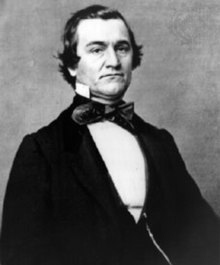
Back ويليام لونديس يانسى ARZ ویلیام لووندز یانسی AZB William Lowndes Yancey German William Lowndes Yancey French William Lowndes Yancey Polish
William Lowndes Yancey | |
|---|---|
 | |
| Confederate States Senator from Alabama | |
| In office February 18, 1862 – July 27, 1863 | |
| Preceded by | New constituency |
| Succeeded by | Robert Jemison |
| Member of the U.S. House of Representatives from Alabama's 3rd district | |
| In office December 2, 1844 – September 1, 1846 | |
| Preceded by | Dixon Lewis |
| Succeeded by | James Cottrell |
| Personal details | |
| Born | August 10, 1814 Warren County, Georgia, U.S. |
| Died | July 27, 1863 (aged 48) Montgomery, Alabama, C.S. |
| Political party | Democratic |
| Alma mater | Williams College |
William Lowndes Yancey (August 10, 1814 – July 27, 1863) was a political leader in the Antebellum South. As an influential "Fire-Eater", he defended slavery and urged Southerners to secede from the Union in response to Northern antislavery agitation.
Though a critic of John C. Calhoun at the time of the Nullification Crisis of 1832–33, in the late 1830s, Yancey began to identify with Calhoun, and, by 1849, Yancey was a firm supporter of Calhoun's "Southern Address" and an adamant opponent of the Compromise of 1850. Throughout the 1850s, Yancey demonstrated an ability to hold large audiences under his spell for hours at a time and was sometimes referred to as the "Orator of Secession".[1] At the 1860 Democratic National Convention, he was instrumental in splitting the party into Northern and Southern factions as a leading opponent of Stephen A. Douglas and the concept of popular sovereignty. He used the phrase "squatter sovereignty" in a speech he gave at the convention to describe popular sovereignty.[2]
During the American Civil War, Yancey was appointed by Confederate President Jefferson Davis to head a diplomatic delegation to Europe in the attempt to secure formal recognition of Southern independence. In these efforts, Yancey was unsuccessful and frustrated. Upon his return to America in 1862, Yancey was elected to the Confederate States Senate, where he was a frequent critic of the Davis Administration. Suffering from ill health for much of his life, Yancey died during the Civil War, in July 1863 at the age of 48.
- ^ Craven 1947, p. 276, Potter 1976, p. 409. Potter refers to Yancey as "the most silver-tongued of a race of uninhibited orators, and the most fervent exponent of southern rights."
- ^ p. 250, Democratic Party. National Convention, Charleston and Baltimore, 1860. Proceedings of the Conventions at Charleston and Baltimore. Washington, 1860.
© MMXXIII Rich X Search. We shall prevail. All rights reserved. Rich X Search